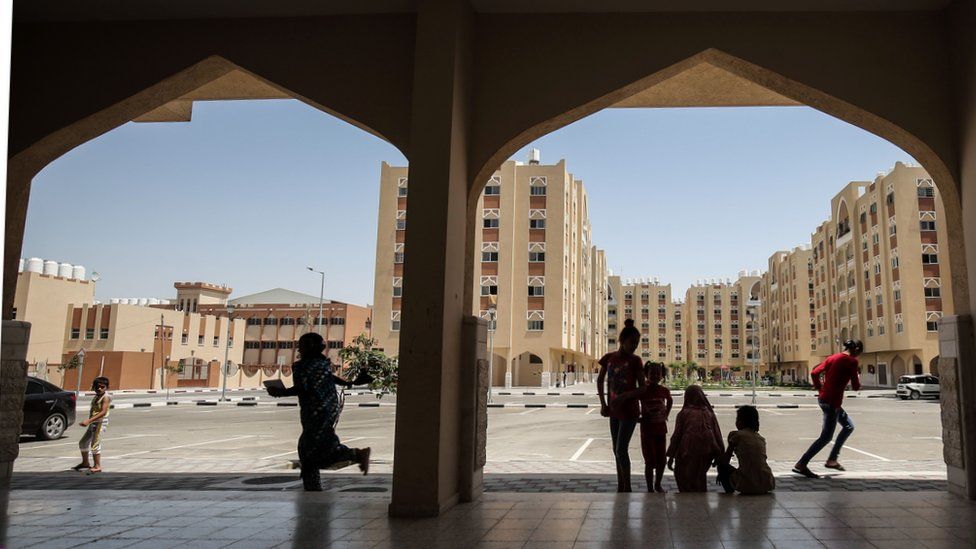Qatar Gulf row threatens cash crisis for Gaza
- Published

In a playground in Sheikh Hamad City, children shriek with delight, while their parents chat in the cool shade of their peach-coloured flats.
This huge housing project - now one of the most desirable addresses in Gaza - was built since 2012 with money from Qatar and named after the former ruler of the wealthy Gulf state.
So far, more than 2,000 Palestinians - mostly low-income families - have moved in.
The complex has a new school, shops, an impressive mosque and plenty of greenery. There is a constant whirr of construction noise as more buildings are erected.
But as the regional crisis over Qatar escalates, Palestinians here - as elsewhere in the impoverished territory - fear the loss of their major donor and ally.
"We're going to be the victims," says one resident, Baha Shalaby. "Everything's going to stop - the money, the support, the infrastructure, the building work."
Economic lifeline
In recent years, Qatar has spent hundreds of millions of dollars on new homes, a hospital and main roads in the Gaza Strip. It has pledged about $1bn (£780m) more.
It is not yet clear how its projects will be affected by the ongoing row with Saudi Arabia and other Gulf Arab countries. They are trying to economically isolate Qatar, accusing it of fostering terrorism - a charge the emirate strongly denies.
However, the engineer in charge of fixing Gaza's main north-south road warns of the possible wider implications of any cuts.
"We have hundreds of workers, all supporting families," says Hanafi Sadallah.
"Levels of unemployment in Gaza are very high, so if the Qataris end our funding, they'll all just be left sitting at home."
Just over 40% of Gazans are out of work, according to Palestinian officials - one of the highest unemployment rates in the world.
One of Saudi Arabia's demands has been for Qatar to stop backing Hamas, which runs Gaza.
The Islamist group took over by force a decade ago - ousting Palestinian Authority (PA) security forces, a year after Hamas won legislative elections.
Hamas leaders insist that Qatari help to Gaza has been primarily charitable.
"The houses that were built are not for Hamas, the streets that were asphalted are not for Hamas," one senior figure, Mahmoud Zahar, tells the BBC.
"The humanitarian institutions - hospitals and schools, they're also for the Palestinian people. All attempts to hitch Hamas to Qatar are wrong and void."
Israel says Hamas has also used foreign funding to bolster its military infrastructure, which its blockade aims to keep from strengthening.
To try to prevent any such accusations against its projects, Doha set up its own coordination office in Gaza and deals directly with contractors or works with UN agencies.
Easing pressure
Nevertheless, Qatar's initiatives have buoyed Hamas through difficult times - the tight border restrictions imposed by both Israel and Egypt, and three bloody conflicts with Israel.
There has also been political and diplomatic support from Doha.
The emir of Qatar is the only head of state to have visited the Palestinian territory since Hamas has been in charge.
Many leaders of the group - including its former head, Khaled Meshaal, have been living in luxurious exile in Doha.
Now as Hamas seeks to ease pressure on its patron, several have reportedly left at Qatar's request.
Last month, the group also announced a new policy document in Doha, which tempered its long-held position against accepting an interim Palestinian state, and made no mention of its parent organisation, the Muslim Brotherhood.
The Brotherhood has been categorised as a terrorist group by Egypt, Saudi Arabia and the United Arab Emirates.
'We are Qatar'
The latest developments concerning Qatar come amid mounting political and economic strain on Hamas.
US President Donald Trump has said that, alongside the so-called Islamic State, al-Qaeda, and Hezbollah, Hamas is contributing to a regional "humanitarian and security disaster".
Last week, Israel agreed to a PA plan to cut power supplies to two million people in Gaza that will reduce their daily average of four hours of electricity by 45 minutes.
Hamas accuses its political rivals of plotting with the Trump administration and Israel to unseat it in Gaza.
Many of its members link local and wider regional developments.
"Qatar is being punished for speaking freely and supporting the Arab Spring," remarks Hamas parliamentarian, Yahya Musa, at a small rally in Sheikh Hamad City.
"It's being punished for supporting us and the resistance. We stand with our brothers to reject US plans against Qatar and the conspiracy against the resistance."
As he speaks, children wave Palestinian and Qatari flags, alongside signs reading "Solidarity with Qatar" and "We are all Qatar".
The Palestinians here are banking on a diplomatic solution to the crisis. Without one, they know they could end up paying the price.
- Published1 July 2021
- Published8 July 2015
- Published18 May 2017
- Published16 June 2017
- Published9 June 2017